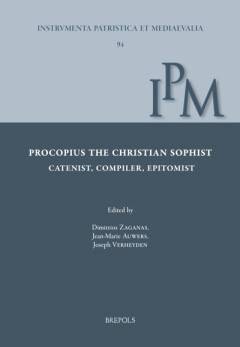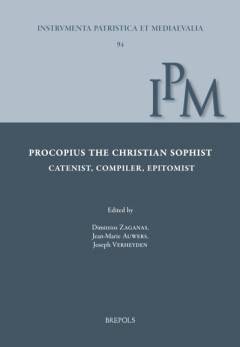
- Retrait gratuit dans votre magasin Club
- 7.000.000 titres dans notre catalogue
- Payer en toute sécurité
- Toujours un magasin près de chez vous
- Retrait gratuit dans votre magasin Club
- 7.000.0000 titres dans notre catalogue
- Payer en toute sécurité
- Toujours un magasin près de chez vous
Procopius the Christian Sophist
Catenist, Compiler, Epitomist
Jean-Marie Auwers, Joseph Verheyden, Dimitrios Zaganas
Livre relié | Anglais, Français, Italien
169,95 €
+ 339 points
Description
The rich literary production of Gaza in the fifth and sixth centuries AD has received quite some attention in recent scholarship. Yet, the figure and work of Procopius the Sophist, as author of catenae, compiler, and epitomist of patristic exegesis, have remained relatively unknown and under-explored. This collection of essays delves deeply into Procopius' exegetical work. At the outset, a strong case is made that one should distinguish between the famous orator of Gaza and "the Christian sophist" Procopius. A first large section of the book deals with the Genesis Epitome that is studied from three different angles: the limited and as a rule critical use of Origen and his tradition; the importance given to Theodore of Mopsuestia's exegesis of Gen 1-3; and the relations between Procopius' Epitome and John Philoponus' De opificio mundi. The section on the Exodus Epitome studies the specificity of Procopius' work in comparison to the Catena on Exodus, the way the material is organised, and the literary genre of the work. The volume further contains contributions on the connections between the Scholia on Kings attributed to Procopius, the type B catena, and the so-called "Catena Lipsiensis"; the relations between Procopius' Catena on Proverbs and other catenae on this book; the sources of the Isaiah Epitome that show a diligent and able compiler at work; and the comparison between the characteristic features of Procopius' Epitomes and those of the Catena III on Obadiah. As a whole, it offers a wide perspective and significantly advances research on, and our knowledge of, Procopius the Christian sophist, a still somewhat mysterious early Byzantine author and scholar.
Spécifications
Parties prenantes
- Auteur(s) :
- Editeur:
Contenu
- Nombre de pages :
- 349
- Langue:
- Anglais, Français, Italien
Caractéristiques
- EAN:
- 9782503609898
- Date de parution :
- 18-04-24
- Format:
- Livre relié
- Format numérique:
- Genaaid
- Dimensions :
- 162 mm x 242 mm
- Poids :
- 725 g

Les avis
Nous publions uniquement les avis qui respectent les conditions requises. Consultez nos conditions pour les avis.






